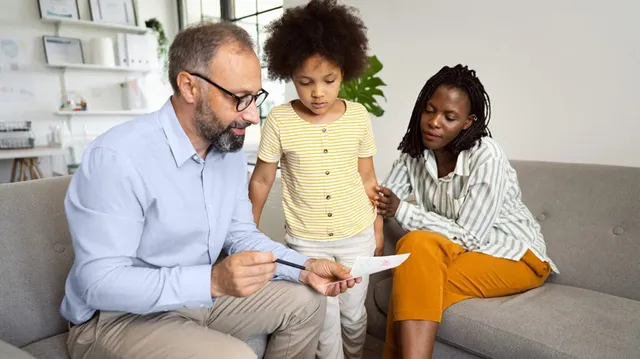
Childhood anxiety is a growing concern in today’s society, affecting millions of children worldwide. Anxiety disorders can manifest in different ways and require specialized attention to be treated effectively. Identifying early symptoms of childhood anxiety is critical for effective counseling interventions to prevent long-term negative consequences.
Anxiety is a fundamental emotion that helps individuals prepare for challenging situations and respond appropriately. However, excessive fear or worry can lead to significant problems affecting the child's academic, social, and family life. Counselors play an essential role in identifying and treating anxiety disorders through various psychotherapies and evidence-based interventions . Sobook an appointment with Mindful experts for details regarding symptoms of anxiety . This article aims to provide parents, educators, clinicians, and counselors with insights on how to identify common symptoms of childhood anxiety and implement counseling interventions effectively.
The prevalence of childhood anxiety
Childhood anxiety is a growing concern that affects millions of children across the world. According to research, about one in eight children aged between six and twelve years old has an anxiety disorder. Anxiety disorders are common mental health conditions that are characterized by excessive and persistent worry, fear, or dread that interferes with daily activities. The most common types of childhood anxiety disorders include generalized anxiety disorder (GAD), separation anxiety disorder (SAD), social phobia, panic disorder, and specific phobias.
Anxiety can have a significant impact on a child's physical and emotional well-being. Children with anxiety may experience sleep disturbances, irritability, difficulty concentrating in school, frequent stomachaches or headaches, nausea or vomiting, increased heart rate or shortness of breath. They may also avoid social situations or refuse to attend school altogether. Therefore it is essential for parents and caregivers to identify symptoms early on so their child can receive the necessary support.
Identifying symptoms
Identifying symptoms of childhood anxiety is crucial in order to provide effective counseling interventions. Symptoms can include excessive worry, fear or nervousness that interfere with daily activities, difficulty sleeping or frequent nightmares, physical symptoms such as stomachaches or headaches, avoidance of certain situations or objects, and irritability or restlessness. Additionally, children may display anxious behavior through excessive reassurance seeking from adults.
In order to properly identify these symptoms, it is important for counselors to conduct a thorough assessment and gather information from both the child and their caregivers. This can involve using standardized questionnaires or conducting interviews to gain a comprehensive understanding of the child’s experiences and behaviors.
Causes and risk factors:
Causes and risk factors for childhood anxiety are multifaceted and complex. Genetic predisposition, environmental factors, and temperament can all play a role in the development of anxiety disorders. Children may also develop anxiety as a result of traumatic experiences or stressful life events, such as divorce or moving to a new school.
Children who have parents with anxiety disorders are at an increased risk for developing anxiety themselves. Additionally, children who experience overprotective parenting or have overly critical parents may also be more susceptible to developing anxiety. Other risk factors include low self-esteem, social isolation, and academic pressure.
Effective counseling interventions:
Effective counseling interventions play a crucial role in addressing childhood anxiety. One such intervention is cognitive-behavioral therapy (CBT), which helps children identify and challenge negative thought patterns that contribute to their anxiety. Through CBT, children learn coping strategies such as relaxation techniques, positive self-talk, and problem-solving skills.
Another effective intervention is exposure therapy, which involves gradually exposing children to feared situations or objects in a safe and controlled environment. This helps children desensitize to their fears and build confidence in managing anxiety-provoking situations. In addition to these interventions, psychiatrists seattle is family-based therapies can also be beneficial in supporting the child's treatment progress by providing education on anxiety management techniques and reducing family stressors that may worsen the child's symptoms.
Preventing long-term negative effects
Long-term negative effects of childhood anxiety can have a significant impact on an individual's mental health, social relationships, and overall quality of life. One way to prevent these effects is through early identification and intervention of symptoms. Parents, teachers, and healthcare professionals should be trained to recognize signs of anxiety in children such as excessive worry, physical symptoms like headaches or stomachaches, avoidance behavior or difficulty sleeping.
Effective counseling interventions for childhood anxiety include cognitive-behavioral therapy (CBT) which helps children learn coping strategies and gain control over their anxious thoughts. Family therapy can also be beneficial to involve parents in the treatment process and improve family communication patterns. Additionally, mindfulness-based techniques such as meditation or deep breathing exercises can help children manage their anxiety symptoms in the moment.
Conclusion: Seeking help for childhood anxiety
In conclusion, childhood anxiety is a common and treatable mental health concern that can have lasting effects if left unaddressed. Identifying symptoms early on is crucial for effective counseling interventions and positive outcomes. Through a combination of cognitive-behavioral therapy, mindfulness techniques, and parental involvement, children with anxiety can learn coping skills and strategies to manage their symptoms. It's important to spread awareness about childhood anxiety and encourage parents, caregivers, and educators to seek professional help when necessary. With the right support and resources, children with anxiety can thrive and lead fulfilling lives. Let's work together to prioritize the mental well-being of our youth.